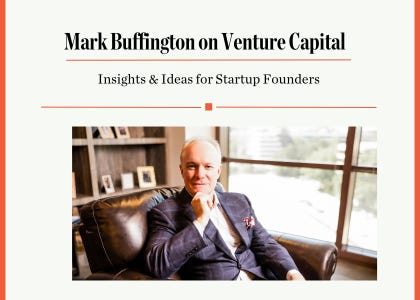Strong But Not Stubborn: The Right Founder Mindset
Mental toughness will get you started. Mental flexibility will help you finish strong—and build something that lasts.
Founding a startup can be one of the most challenging endeavors a person can undertake. It requires not only the ability to come up with a winning idea but also the grit, resilience, determination, and perseverance to make it a reality. Being mentally tough is essential for success in entrepreneurship, but it's equally important to balance that toughness with mental flexibility.
Mental toughness is essential for entrepreneurs because it enables them to overcome obstacles, push through challenges, and stay focused on their goals. It allows them to maintain a positive attitude and outlook even in the toughest of times. However, mental toughness alone is not enough. Sometimes, the same traits that make a person mentally tough can also make them stubborn and resistant to change. This is where mental flexibility comes in.
Mental flexibility is the ability to adapt to changing circumstances, adjust to new situations, and revise one's thinking when necessary. It's what allows founders to pivot their business strategy when necessary, consider new ideas, and seek out new opportunities. It requires a willingness to listen to feedback, learn from failure, and be open to new perspectives. Without mental flexibility, founders risk becoming too set in their ways, too focused on a single idea or strategy, and too resistant to change. This can lead to missed opportunities, stagnation, and ultimately, failure. Mental flexibility allows founders to evolve and grow with their business, adapting to new challenges and opportunities as they arise.
Striking the Right Balance Between Mental Toughness and Mental Flexibility
Why is it important for founders to balance mental toughness and mental flexibility?
Both are essential for success in entrepreneurship. Founders need to be mentally tough to weather the ups and downs of starting a business, but they also need to be mentally flexible to adjust to changing circumstances and seize new opportunities.
For example, imagine a founder who has poured all their time, energy, and resources into a single product idea. They've invested everything they have into making it a reality, but after launching the product, they discover that the market isn't interested. A mentally tough founder might keep pushing, convinced that they just need to work harder to make it successful. But a mentally flexible founder would be willing to pivot, to consider new ideas and strategies, and to move on from their original plan if necessary.
“Being mentally tough is essential for success in entrepreneurship, but it's equally important to balance that toughness with mental flexibility.”
Mental flexibility can also help founders avoid burnout. When a person is mentally tough but inflexible, they may become so focused on achieving their goals that they neglect other important aspects of life, such as self-care, relationships, and hobbies. This can lead to burnout, which can ultimately harm the business. By being mentally flexible, founders can maintain a healthy work-life balance, prioritize self-care, and avoid burnout.
At the end of the day, mental toughness and mental flexibility are both essential traits for success in entrepreneurship. Founders need to be mentally tough to overcome challenges, stay focused on their goals, and maintain a positive attitude. But they also need to be mentally flexible to adjust to changing circumstances, seize new opportunities, and avoid burnout. By balancing these two traits, entrepreneurs can build successful businesses that make a positive impact on the world.
From Idea to Endurance: Competence Drives Competitiveness
In the startup and funding ecosystem, the impact of management competence is often underestimated and undervalued. It is a common failure of judgment that plagues many underinformed and overly optimistic angels and venture capitalists. Over more than 20 years of working with startups, I’ve also seen many founders who undervalue management competence—mos…
Contact us to learn more about our process of developing capable, resilient founders – and the results it produces.
Mark Buffington is the co-founder and CEO of BIP Capital and the Managing Partner of BIP Ventures. Since launching BIP Capital almost 20 years ago, he has led the firm to become one of the most consistently active and recognized venture capital brands outside of Silicon Valley.
Under Mark’s leadership, BIP Ventures has established a reputation for delivering exceptional returns to investors, consistently outperforming public market equivalents and top-quartile Venture Capital benchmarks. (1)
With decades of experience as an entrepreneur and operator, Mark is deeply committed to helping founders and portfolio company leadership teams build category-leading companies and drive premium exit outcomes.
He has developed some of the industry’s most innovative platforms, including a private equity Evergreen BDC, a proprietary deep-data AI platform, and a Performance Engineering framework that drives repeatable, high-growth outcomes for founders. The results of these efforts speak for themselves. Founders who partner with Mark and the BIP Ventures team achieve more life-changing outcomes than when they work with other VCs. Across six vintages of funds, more than 60% of capital invested has returned gains, and over half of all investments have achieved a 3x return or better. (2)
Since 2006, Mark has led investments in more than 150 companies spanning growth stages and sectors, including Healthcare Tech, Digital Media, EdTech, Enterprise SaaS, FinTech, and Advanced Computing. Notable investments include Vendormate, Ingenious Med, QA Symphony/Tricentis, PlayOn, Huddle Tickets, Tropical Smoothie Cafe, Cypress.io, ConnexPay, REACH Health, Trella Health, Shareholder InSite, ChartSpan and Aspirion Health Resources. (3)
Mark holds an MBA from Tulane University’s A.B. Freeman School of Business and a B.S. from the Georgia Institute of Technology, where he was also a varsity letterman in baseball. He serves on the boards of several companies, including NFHS Network, Rhyme, ShiftMed, AchieveIt, Trella Health, PlayOn, ChartSpan, and the BIP Advisor Acquisition Fund. He is also active on several nonprofit boards, including the Buckhead Coalition and the Metro Atlanta Chamber Executive Board.





